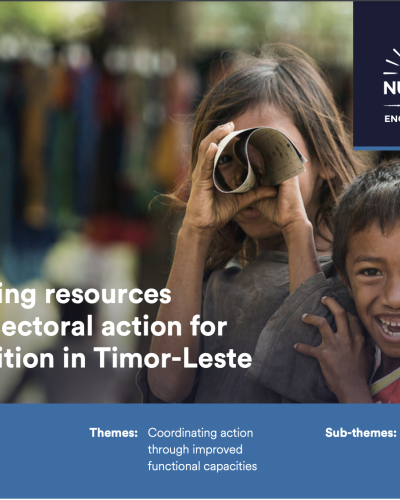Consolidating resources and multi-sectoral action for better nutrition in Timor-Leste

Timor-Leste is a small, relatively new country with one of the highest burdens of malnutrition and food insecurity in the world.
The COVID-19 pandemic, the tropical cyclone Seroja, and the rising costs of food and other necessities due to the war in Ukraine have all contributed to increasing this burden.
Timor-Leste is committed to achieving its 2030 Sustainable Development Goals (SDGs), especially SDG 2 on Zero Hunger.
Since the country achieved independence in 2002, many policies and strategies have been launched with strong political commitment from a range of state institutions and leaders.
For example: The National Council for Food Security, Sovereignty and Nutrition (KONSANTTIL) was established in 2010 following the Comoro Declaration, aimed at ending hunger in the country.
In 2014, the President’s Nutrition Award was launched to recognize and encourage best practices across sectors and raise awareness of the issues.
The President led government-wide round-table dialogues, which resulted in the Consolidated National Action Plan for Nutrition and Food Security (CNAP NFS) – approved by the Council of Ministers in 2020.
The CNAP NFS is a multi-sectoral action plan that consolidates over 300 different interventions across a range of strategies into 18 high-impact, evidence-based priorities spanning seven sectors (health; agriculture and fisheries; social solidarity; education, youth and sports; tourism, trade and industry; public works; and equality and inclusion).
The CNAP NFS was developed as a multi-stakeholder national action plan to achieve SDG 2 targets and improve nutrition and food security in Timor-Leste. This action plan will help the country make best use of its available resources, identify gaps for government and development partners to fill, and advocate for increased investments.





















